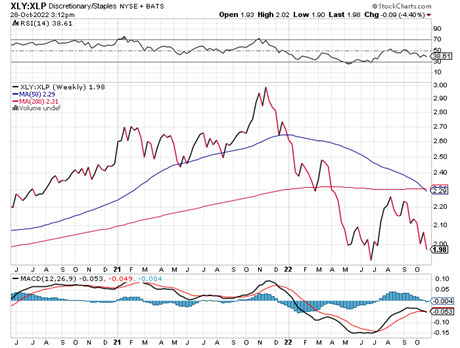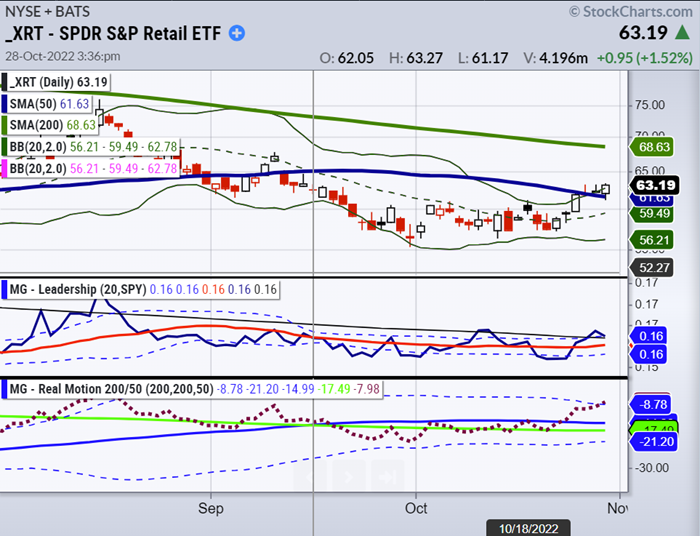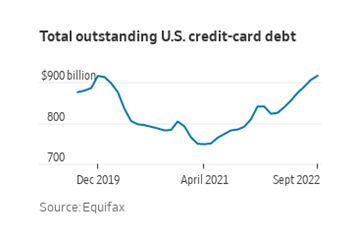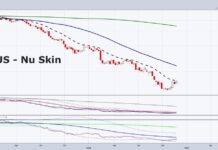GDP data painted a somewhat roseate picture for the US economy this week.
Yet inflation is still rising.
The PCE price index climbed by 0.3% in a month and was up 6.2% from the prior year. Still very far from the Fed’s 2% inflation target.
Consumer spending has moderately increased while sentiment rose more than expected.
GDP numbers, including consumption, only tell part of the story. Consumer discretionary can be contrasted with consumer staples, a classification for companies that produce daily necessities.
As represented by XLY, consumer discretionary was up over the last five days by 2.0%, and consumer staples, defined by XLP, was more than double that – 4.5% over the week.
Consumer Discretionary is defined by the Consumer Discretionary Select Sector SPDR ETF (XLY) and Consumer Staples defined by the Consumer Staples Select Sector SPDR ETF (XLP). The chart displays the price ratio, or the price spread, of consumer discretionary over consumer staples since 2020.

The chart above shows that consumer staples has been the clear winner since December 2021.
Is it too early to declare that the US economy has turned a corner?

Like CPI out earlier this month, the latest PCE figures released on Friday underscore inflation’s entrenched nature and provide more data that the US economy is still facing some headwinds.
Granny Retail (XRT) is the backbone of our economy, and if consumers can’t afford to live comfortably and continue to spend, it will spell trouble.
Families are cutting back on discretionary purchases. Plus, folks are doubtful the Fed has its back to curtail inflation.
Americans are using credit cards to finance major purchases. US credit-card debt is back to pandemic levels, as seen below.

A recent Census Bureau survey found that four in 10 households said it had been somewhat challenging to cover usual household expenses.
Consumer staples are generally less impacted by inflation than discretionary products, so a shift in consumer spending could mean trouble for companies that produce luxurious goods and services.
Nonetheless, Granny Retail (XRT), a basket of consumer discretionary and staples, is holding up for now.
However, with wages rising and the Fed continuing its tightening campaign, it remains to be seen just how long this can last.
It’s important to remember that while markets may appear strong in the short term, they can quickly turn – so investors should exercise caution and practice sound risk management.
If you’re looking to stay ahead of the curve, it’s crucial to monitor consumer behavior. With MarketGauge’s trading platform and Mish’s premium service, you’ll get alerts on today’s fast-moving stocks to beat the market.
Last Chance to Sign Up for:
The Money Show, October 30 – November 1
Our members get 20% off the registration price! Join Mish and many wonderful speakers at the Money Show in Orlando beginning October 30th running thru November 1st. Spend Halloween with us! Use either link to join Mish there!
Stock Market ETFs Trading Analysis & Summary:
S&P 500 (SPY) 386 support with 394 resistance level to watch
Russell 2000 (IWM) 181 support and 186 resistance
Dow (DIA) 326 support and 333 resistance
Nasdaq (QQQ) 277 now support and 284 resistance
KRE (Regional Banks) 62 support and 65 resistance level
SMH (Semiconductors) 188 support and 195 resistance
IYT (Transportation) 208 support and 214 resistance
IBB (Biotechnology) 127 support and 132 first resistance.
XRT (Retail) 61 support and 65 resistance
Twitter: @marketminute
The author may have a position in mentioned securities at the time of publication. Any opinions expressed herein are solely those of the author and do not represent the views or opinions of any other person or entity.








